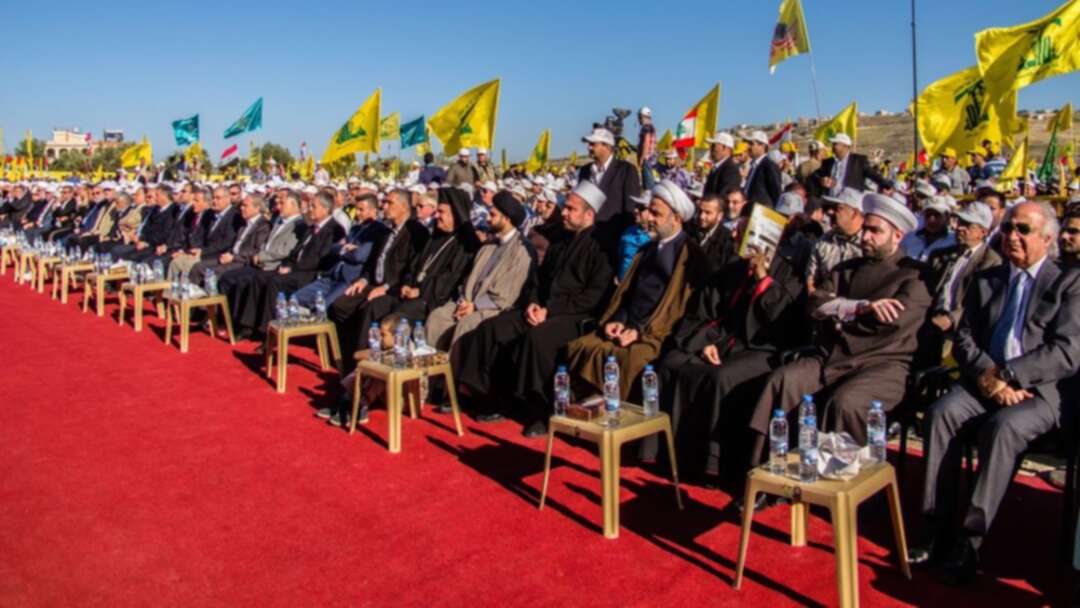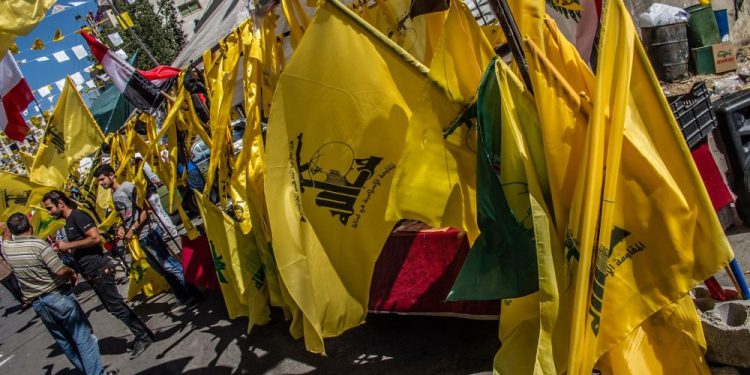-
Hezbollah hammered with criticism amid Lebanon’s crises

The Associated Press reported, driving back to base after firing rockets toward Israeli positions from a border area last month, a group of Hezbollah fighters was accosted by angry villagers who smashed their vehicles’ windshields and held them up briefly.
It was a rare incident of defiance that suggested many in Lebanon would not tolerate provocations by the powerful group that risk triggering a new war with Israel.
As Lebanon sinks deeper into poverty, many Lebanese are more openly criticizing Iran-backed Hezbollah. They blame the group — along with the ruling class — for the devastating, multiple crises plaguing the country, including a dramatic currency crash and severe shortages in medicine and fuel.
“Hezbollah is facing its most consequential challenge in maintaining control over the Lebanese system and what is called the ‘protective environment of the resistance’ against Israel,” said Joe Macaron, a Washington-based Middle East analyst.
The incident along the border and other confrontations — including a deadly shooting at the funeral of a Hezbollah fighter and rare indirect criticism by the country’s top Christian religious leader — have left the group on the defensive.
The anger has spread in recent months, even in Hezbollah strongholds where many have protested electricity cuts and fuel shortages as well as the currency crash that has plunged more than half the country’s 6 million people into penury.

In its strongholds, predominantly inhabited by Shiite Muslims, it is not uncommon now for people to speak out against the group. They note that Hezbollah is paying salaries in U.S. dollars at a time when most Lebanese get paid in Lebanese currency, which has lost more than 90% of its value in nearly two years.
Protests and scuffles have broken out at gas stations around Lebanon and in some Hezbollah strongholds. In rare shows of defiance, groups of protesters have also closed key roads in those areas south of Beirut and in southern Lebanon.
In recent speeches, Hezbollah leader Sayyed Hassan Nasrallah has appeared angry, blaming the shortages on what he describes as an undeclared Western siege. The chaos in Lebanon, he said, is being instigated from a “black room” inside the U.S. Embassy.
Read more: Lebanon entering state of ‘exodus’ as political, economic crises accelerates
Critics say that rather than push for reform, Hezbollah has stood by its political allies who resist change. They say the group is increasingly pulling Lebanon into Iran’s orbit by doing its bidding, and that U.S. sanctions against Iran and Hezbollah have made things harder.
Where Hezbollah was once considered an almost sacred, untouchable force fighting for a noble cause — the fight against the Israeli enemy — it is now seen by many simply as part of the corrupt political clique responsible for the country’s epic meltdown. Still, when it comes to fighting Israel, the group enjoys unwavering backing within its base of support.
Often criticized for operating as a state within a state, Hezbollah has tried to ease the effects of the crisis on its supporters in similar fashion.
While the government has been working for months to issue ration cards to poor families, Hezbollah has been well ahead. It has issued two such cards to poor families living in Hezbollah bastions, one called Sajjad after the name of a Shiite imam, and a second called Nour, or light, for its fighters and employees of its institutions who number about 80,000.
“We will serve you with our eyelashes,” is Hezbollah’s slogan to serve the extremely poor in its communities — a Lebanese term meaning they are ready to sacrifice anything to help others.
The tens of thousands carrying Sajjad cards not only can buy highly subsidized products from dozens of shops spread around Lebanon — mostly staples made in Lebanon, Iran and Syria — but can also get medical treatment and advice at 48 Hezbollah-run clinics and medical centers around Lebanon.
Nasrallah is also organizing a sea corridor carrying oil from Iran to Lebanon to help alleviate the fuel shortages, with the first tanker believed to be on its way. The move has been praised by Hezbollah’s supporters and heavily criticized by its opponents, who say it risks bringing more sanctions on Lebanon.
In the border incident, villagers from the minority Druze sect intercepted Hezbollah fighters on their way back after firing rockets toward a disputed area held by Israel. The villagers briefly detained them and the mobile rocket launcher they used after accusing them of putting them at risk if Israel strikes back.
The fighters and the launcher were then handed over to Lebanese troops, who released them on the same day.
Later, Hezbollah angered many Christians after supporters launched a social media campaign against the head of Lebanon’s Maronite Catholic church, the country’s largest, accusing him of treason after he criticized the group for firing the rockets on Israeli positions.
Read more: EU Ambassador expresses deep concern over Lebanon’s fast deterioration
The widely feared group has been hammered by accusations from its local opponents. They include silencing its opponents, facilitating smuggling of fuel and other subsidized items to neighboring Syria, and alienating oil-rich Gulf countries like Saudi Arabia, leading them to halt financial assistance because of Hezbollah’s dominance of Lebanon.
The most serious charge has been a claim by opponents at home that the group brought in the hundreds of tons of ammonium nitrate that exploded at Beirut’s port last year, killing at least 214 people, wounding thousands and destroying parts of the capital.
No direct connection to Hezbollah has emerged, but unsubstantiated theories that tie the group to the stockpile abound. One claim is that Hezbollah imported the chemicals on behalf of the Syrian government, which used them in barrel bombs against rebel-held areas during the neighboring country’s 10-year conflict.
“Hezbollah’s agencies are active at the port and this is known to security agencies and all Lebanese. Why is Sayyed Hassan Nasrallah above questioning?” asked Samy Gemayel, head of the right-wing Christian Kataeb Party recently.
Hezbollah has repeatedly denied any link to the ammonium nitrate. But Nasrallah further angered families of the victims and other Lebanese recently by criticizing the judge leading the investigation into the blast, suggesting he should be replaced. Nasrallah described Judge Tarek Bitar as “politicized” after he filed charges against some legislators and former Cabinet ministers allied with Hezbollah.
“There is an attempt to satanize Hezbollah and tarnish its image,” said Lebanese University political science professor Sadek Naboulsi. The professor, who has ties to the group, accused foreign powers including Saudi Arabia, the United Arab Emirates, Israel and the U.S. of seeking to incite internal strife between Lebanon’s Shiite and Sunni Muslim communities with the aim of weakening Hezbollah. He added that Hezbollah had overcome such pressures in the past and emerged more powerful.
A serious test for Hezbollah came in early August when a funeral of a militant came under fire by suspected Sunni gunmen on the southern entrance of Beirut. Three Hezbollah supporters were killed and 16 were wounded in the shooting in the town of Khaldeh.
Hezbollah did not retaliate and instead called on Lebanese authorities to investigate the case.
“An increasing number of Lebanese are realizing that the concept of a Lebanese state cannot coexist with a powerful armed militia serving an outside power,” wrote Michael Young, editor of Diwan, the blog of the Carnegie Middle East Center.
Macaron said Hezbollah will not be the same after the crisis and will have to adapt to ensure political survival in the long term.
“What they can do at this point is to limit losses as much as possible,” he said.
Source: AP
You May Also Like
Popular Posts
Caricature
BENEFIT Sponsors BuildHer...
- April 23, 2025
BENEFIT, the Kingdom’s innovator and leading company in Fintech and electronic financial transactions service, has sponsored the BuildHer CityHack 2025 Hackathon, a two-day event spearheaded by the College of Engineering and Technology at the Royal University for Women (RUW).
Aimed at secondary school students, the event brought together a distinguished group of academic professionals and technology experts to mentor and inspire young participants.
More than 100 high school students from across the Kingdom of Bahrain took part in the hackathon, which featured an intensive programme of training workshops and hands-on sessions. These activities were tailored to enhance participants’ critical thinking, collaborative problem-solving, and team-building capabilities, while also encouraging the development of practical and sustainable solutions to contemporary challenges using modern technological tools.
BENEFIT’s Chief Executive Mr. Abdulwahed AlJanahi, commented: “Our support for this educational hackathon reflects our long-term strategic vision to nurture the talents of emerging national youth and empower the next generation of accomplished female leaders in technology. By fostering creativity and innovation, we aim to contribute meaningfully to Bahrain’s comprehensive development goals and align with the aspirations outlined in the Kingdom’s Vision 2030—an ambition in which BENEFIT plays a central role.”
Professor Riyadh Yousif Hamzah, President of the Royal University for Women, commented: “This initiative reflects our commitment to advancing women in STEM fields. We're cultivating a generation of creative, solution-driven female leaders who will drive national development. Our partnership with BENEFIT exemplifies the powerful synergy between academia and private sector in supporting educational innovation.”
Hanan Abdulla Hasan, Senior Manager, PR & Communication at BENEFIT, said: “We are honoured to collaborate with RUW in supporting this remarkable technology-focused event. It highlights our commitment to social responsibility, and our ongoing efforts to enhance the digital and innovation capabilities of young Bahraini women and foster their ability to harness technological tools in the service of a smarter, more sustainable future.”
For his part, Dr. Humam ElAgha, Acting Dean of the College of Engineering and Technology at the University, said: “BuildHer CityHack 2025 embodies our hands-on approach to education. By tackling real-world problems through creative thinking and sustainable solutions, we're preparing women to thrive in the knowledge economy – a cornerstone of the University's vision.”
opinion
Report
ads
Newsletter
Subscribe to our mailing list to get the new updates!






















